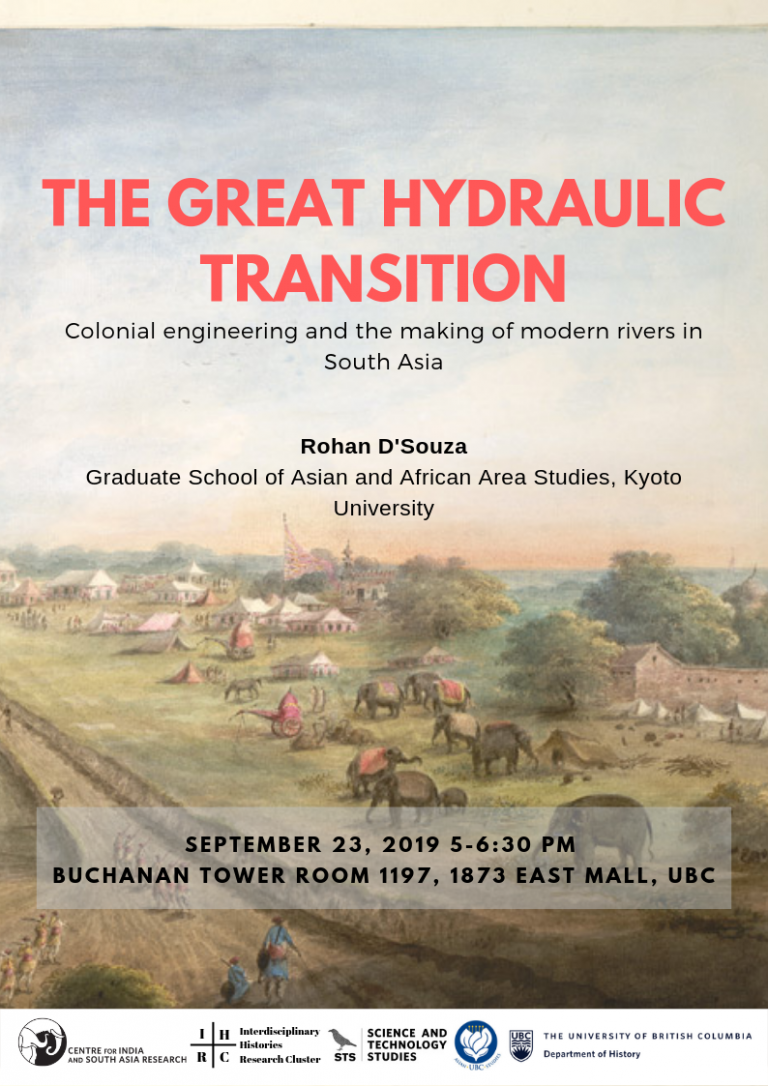This event is in collaboration with the Interdisciplinary Histories Research Cluster, and is co-sponsored by the Department of History, and the Graduate Program in Science and Technology Studies.
Abstract
The immense flowing rivers of South Asia ─ from the sprawling Indus system in the West to the volatile Irrawaddy in the East ─ were turned into modern rivers through the course of British colonial rule in the nineteenth century. This ‘great hydraulic transition’, I argue, was philosophically premised on the need to separate land and water ⎯ as two distinct non-overlapping natural domains. A transition effected, in the main, by the interventions of colonial engineering with which rivers were quantified as units of flow, disclosed by comprehensive control and harnessed with weirs, embankments and dams. The introduction of colonial hydraulic infrastructure, in essence, was to sustain land as legal claim and to be imagined as permanent ownership, while river flows were recast as resource.
Modern rivers as the subdued and stable volumetric channel, however, has remained haunted by its other irrepressible geological energies: as capricious silt leaden currents, fluvial biological webs and recurring torrential entanglements with soil. The transition to a shackled geometric straight line of contained flows, in other words, has been repeatedly called to contend with the rivers many watery pasts of radical seasonal overflow, eclectic channel oscillations, frenzied avulsions and sudden fluvial bursts.
The making of modern rivers in South Asia, I suggest, is a history that brings to the surface the ecological and ideological that has thus far remained submerged by the overbearing triumphalist narrative of colonial engineering. By reconsidering rivers as geomorphological process and as stochastic pulses rather than mere volume and stock, I hope to recover perceptions, philosophical dispositions, institutional mind sets, social complexity and issues of power that shaped the great hydraulic transition in South Asia.
As the quest for large dams and megawatts continues to convulse the political and ecological worlds of South Asia (and many other parts of the world), subversive histories about colonial engineering and river control, I argue, will be critical to how we re-imagine other social possibilities.
Presenter
Rohan D’Souza is Associate Professor at the Graduate School of Asian and African Area Studies (Kyoto University). His PhD was awarded from the Centre for Historical Studies (Jawaharlal Nehru University). He was elected General Secretary of the Jawaharlal Nehru University Student’s Union (1989-90), on the political platform of the All India Student’s Federation.
He has held postdoctoral fellowships at the Agrarian Studies Program (Yale University) and at the University of California (Berkeley), besides having had visiting fellowships at the Centre for the Advanced Study of India (University of Pennsylvania) and at the Resources Management Asia-Pacific (Australian National University). He holds honorary affiliation as Senior Research Associate at the Centre for World Environmental History (University of Sussex) and was the Short Term Chair at the University of Tokyo ( Japan) as Visiting Professor of Contemporary Indian Studies.
He is the author of Drowned and Dammed: Colonial Capitalism and Flood control in Eastern India (2006) and the joint editor of The British Empire and the Natural World: Environmental Encounters in South Asia (2011). He has also edited the Environment, Technology and Development: Critical and Subversive essays (2012) for the Economic and Political Weekly Series. His research interests and publications cover themes in environmental history, political ecology, sustainable development and modern technology.
